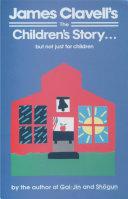"Teacher" to Johnny
The Children's Story (1982)
Quotes from book
The Children's Story

"The Children's Story" is a 4,300-word novelette by James Clavell. It first appeared in Reader's Digest and was printed in book form in 1981. It was adapted by Clavell himself into a thirty minute short film for television which aired on Mobil Showcase.
"Teacher"
The Children's Story (1982)
“Just a moment, children — what does "pledge" mean?”
"Teacher" (played by Jame's Clavell's daughter Michaela Clavell, credited as Michaela Ross).
The Children's Story (1982)
“God bless mommy and daddy, and please can we have some candy.”
"Teacher" leading the class in prayer.
The Children's Story (1982)
"Teacher"
The Children's Story (1982)
Afterword to his short story "The Children's Story" (1963).
The Children's Story (1982)
Context: I asked all kinds of people of every age, "You know the 'I pledge allegiance…'" but before I could finish, at once they would all parrot it, the words almost always equally blurred. In every case discovered that not one teacher, ever — or anyone — had ever explained the words to any one of them. Everyone just had to learn it to say it. The Children's Story came into being that day. It was then that I realized how completely vulnerable my child's mind was — any mind for that matter — under controlled circumstances. Normally I write and rewrite and re-rewrite, but this story came quickly — almost by itself. Barely three words were changed. It pleases me greatly because it keeps asking me questions … Questions like what's the use of "I pledge allegiance" without understanding? Like why is it so easy to divert thoughts and implant others? Like what is freedom and why is it so hard to explain? The Children's Story keeps asking me all sorts of questions I cannot answer. Perhaps you can — then your children will…
Afterword to his short story "The Children's Story" (1963).
The Children's Story (1982)
Context: I asked all kinds of people of every age, "You know the 'I pledge allegiance…'" but before I could finish, at once they would all parrot it, the words almost always equally blurred. In every case discovered that not one teacher, ever — or anyone — had ever explained the words to any one of them. Everyone just had to learn it to say it. The Children's Story came into being that day. It was then that I realized how completely vulnerable my child's mind was — any mind for that matter — under controlled circumstances. Normally I write and rewrite and re-rewrite, but this story came quickly — almost by itself. Barely three words were changed. It pleases me greatly because it keeps asking me questions … Questions like what's the use of "I pledge allegiance" without understanding? Like why is it so easy to divert thoughts and implant others? Like what is freedom and why is it so hard to explain? The Children's Story keeps asking me all sorts of questions I cannot answer. Perhaps you can — then your children will…
“It pleases me greatly because it keeps asking me questions …”
Afterword to his short story "The Children's Story" (1963).
The Children's Story (1982)
Context: I asked all kinds of people of every age, "You know the 'I pledge allegiance…'" but before I could finish, at once they would all parrot it, the words almost always equally blurred. In every case discovered that not one teacher, ever — or anyone — had ever explained the words to any one of them. Everyone just had to learn it to say it. The Children's Story came into being that day. It was then that I realized how completely vulnerable my child's mind was — any mind for that matter — under controlled circumstances. Normally I write and rewrite and re-rewrite, but this story came quickly — almost by itself. Barely three words were changed. It pleases me greatly because it keeps asking me questions … Questions like what's the use of "I pledge allegiance" without understanding? Like why is it so easy to divert thoughts and implant others? Like what is freedom and why is it so hard to explain? The Children's Story keeps asking me all sorts of questions I cannot answer. Perhaps you can — then your children will…
“It is a very pretty flag. … I wish I could have a piece of it.”
"Teacher"
The Children's Story (1982)
Context: It is a very pretty flag. … I wish I could have a piece of it. I know! If it's so important, I think we should all have a piece of it. Don't you? … Now we should decide — who should be allowed to cut the first piece off!
"Teacher"
The Children's Story (1982)
Context: Maybe we didn't pray hard enough. Perhaps we should kneel down like is done in church. Perhaps were using the wrong name. Instead of God, let's say "Our Leader." Let's pray to our leader for candy! Let's pray extra specially hard, and don't open your eyes until I say.